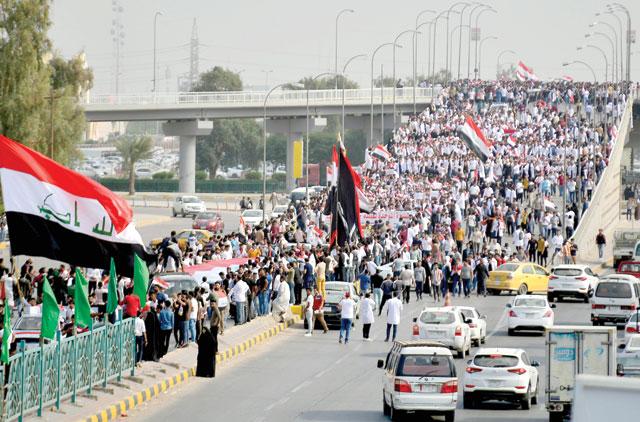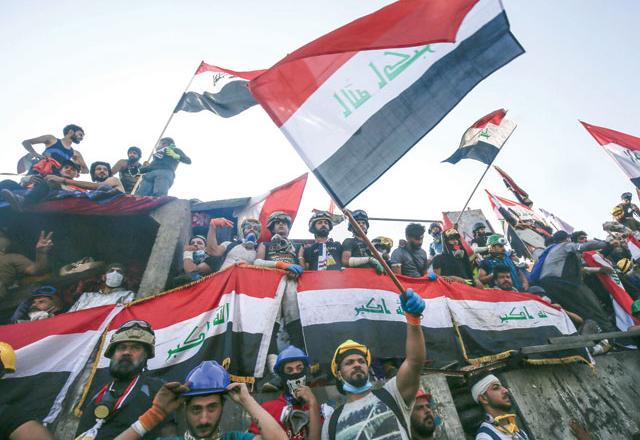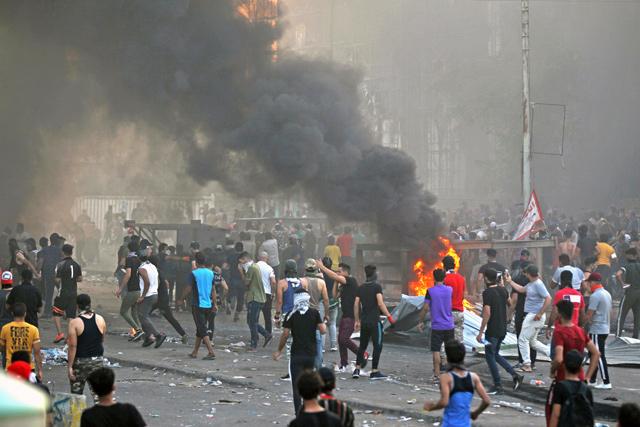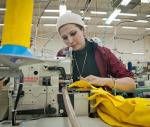You are here
Mounting toll in Iraq protests as Internet cut again
By AFP - Nov 05,2019 - Last updated at Nov 05,2019
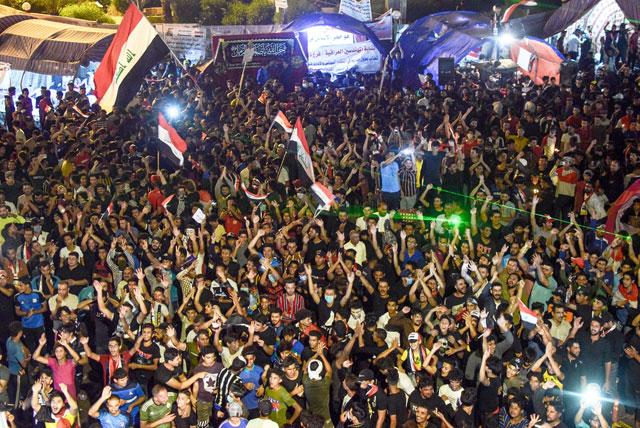
Iraqi protesters gather during a late anti-government demonstration in Nasiriyah, the capital of the southern province of Dhi Qar on November 4, 2019 (AFP photo)
BAGHDAD — A mounting death toll in Baghdad and across southern Iraq coupled with reimposed Internet restrictions sparked concerns on Tuesday that anti-government protests would once again trigger chaos.
A first wave of protests that erupted on October 1 met with brutal violence, with at least 157 people killed over six days, most of them protesters in Baghdad, according to an official investigation.
Many were shot dead from rooftops by "unidentified snipers", the probe found.
Protests restarted after a two-week lull, with fewer deaths and an easing by the government of Internet restrictions on social media sites.
But late Sunday and early Monday, the bloodshed resumed, with four protesters killed near the Iranian consulate in the Shiite pilgrimage city of Karbala.
On Monday evening, security forces fired live ammunition at crowds in Baghdad for the first time since rallies resumed, killing two people, medical sources said.
Two protesters were also shot dead in the southern city of Nasiriyah.
And on Tuesday morning, two protesters were killed when security forces attempted to break up crowds blocking the road to the southern port of Umm Qasr, the main entry point for imports of food and medicine.
The deaths brought the overall toll since October 1 to more than 270 killed, according to an AFP count.
Officials have stopped providing running casualty figures.
'Not scared'
The United Nations' mission in Iraq raised the alarm on Tuesday over "serious human rights violations and abuses" in the second wave of demonstrations, citing "unlawful use" of weapons by security forces and armed groups.
Amnesty International has accused Iraqi forces of using two types of military-grade tear gas canisters that have pierced protesters’ skulls and lungs.
Anger over chronic unemployment and widespread official corruption initially fuelled the rallies.
But demonstrators have increasingly called for radical reform of the political system, and turned to strikes and sit-ins to press their demands.
In the southern cities of Kut, Nasiriyah and Diwaniyah, all government offices were closed on Tuesday.
And in the capital, demonstrators remained camped out in Tahrir Square, where they have set up tents and occupied buildings for more than a week.
The Internet went down at midnight and came back around 9:00am (0600 GMT) before being cut again. But protesters vowed to press on regardless.
“They already cut the Internet once, and doing it again won’t do anything,” said Ammar, a 41-year-old protester in Tahrir on Tuesday.
Cybersecurity NGO NetBlocks said on Tuesday’s blackout was “the most severe telecommunication restriction” imposed by Iraqi authorities since October 1.
Iraqi leaders have scrambled to respond to protesters’ demands, but their proposals have yet to impress.
President Barham Saleh has proposed early polls once a new electoral law is agreed.
On Tuesday, he was in the northern city of Erbil to meet with Kurdish officials as part of talks to ease the crisis.
Embattled Prime Minister Adel Abdel Mahdi proposed a series of measures, including hiring drives and social welfare packages.
He called on protesters earlier this week to clear the streets and allow “normal life” to return, but they have defied him in growing numbers.
“We’re not scared of the leaders — they’re the ones who are afraid of us because we’re peaceful,” another protester told AFP on Tuesday morning.
Crowds claim people power
“Tyrants will go but the people will stay,” added an elderly protester in a checkered keffiyah scarf.
Many demonstrators have accused neighbouring Iran of propping up the government they are seeking to overthrow.
Iraq has close but complicated ties with Iran.
The two countries fought a devastating 1980-1988 war, but Iran now has significant sway among Iraqi political and military leaders.
Tehran has sought to calm the demonstrations, with sources reporting senior Revolutionary Guard commander Qassem Soleimani making several visits to “advise” Iraqi authorities on their response.
Iran’s Supreme Leader Ayatollah Ali Khamenei has slammed protests in both Iraq and Lebanon, labelling them conspiracies by the United States and its allies.
“It’s Iranians who rule the country,” said one protester in Tahrir. “We’d rather die than stay under their yoke.”
Related Articles
BAGHDAD — Anti-government rallies swelled in Iraq's capital and south Wednesday as Baghdad faced new pressure from the street, Washington an
BAGHDAD — Iraqi security forces clashed with anti-government protesters near the capital's Tahrir Square on Saturday as anti-government rall
BAGHDAD — Thousands of protesters clashed with riot police in Iraq's capital and across the south on Thursday, the third day of mass rallies


